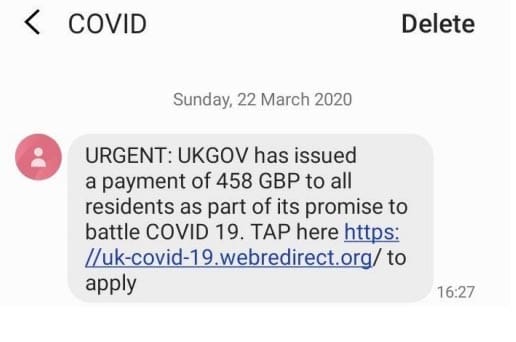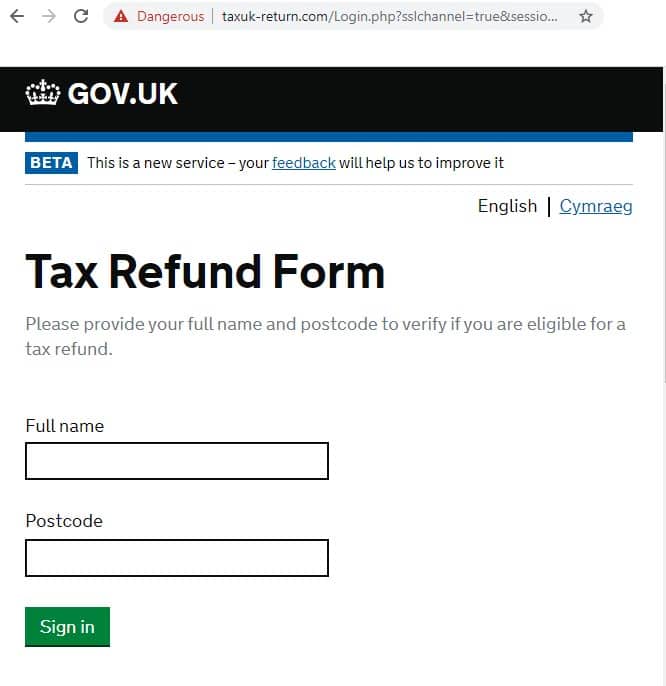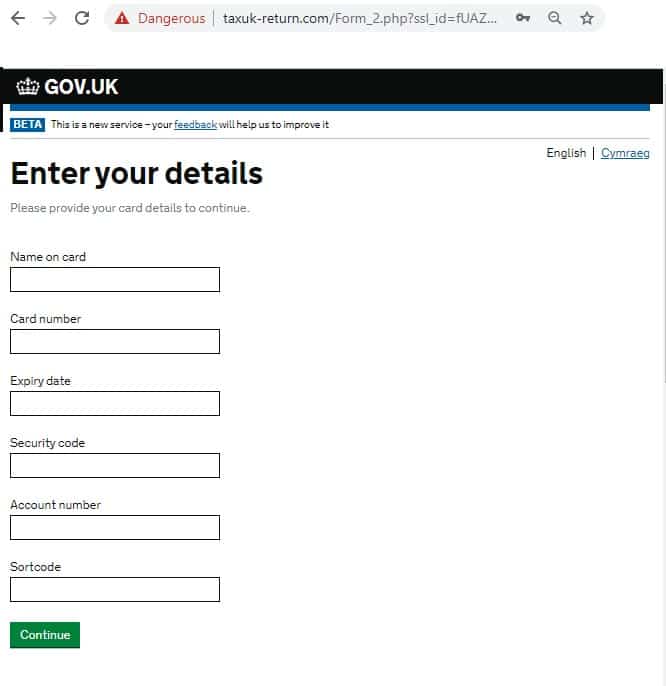Beware of HMRC text message about coronavirus tax rebate. It’s a scam
Scammers are sending out text messages claiming to be from the government or HMRC claiming UK residents can claim tax refunds as a result of the coronavirus outbreak.
However, such text messages contain malicious link to phishing websites that will steal all the data a visitor enters into it.
Examples of such a message can be seen below.
As a result of the current Coronavirus outbreak, we have been forced to issue you with the full amount of your current tax refund. You currently have a pending tax refund of up to £388.67GBP. Please follow the link to calculate your claim.
As Part of the NHS promise to battle the COV-10 virus, HMRC has issued a payment of £258 as a goodwill payment. Follow link to apply.

URGENT: UKGOV has issued a payment of 458 GBP to all residents as part of its promise to battle COVID 19. TAP here -link removed- to apply.
It’s a phishing scam, which is a popular type of scam where a crook pretends to represent a trusted entity to lure a victim into handing over sensitive information. In the case of this scam, the crooks are pretending to be from the HMRC – the UK’s tax and revenue entity.
Those who click the link are led to a phishing website designed to look like the official HMRC website.
Sponsored Content. Continued below...
However it isn’t. It’s a spoof website set up by scammers. While the look and feel of the site may look like the HMRC website, the site is designed and set up by cyber crooks, and any information you enter into it is send directly to the crooks. It’s identity fraud.
And the information the spoof website asks for is extensive, and would result in a victim handing over a catastrophic amount of sensitive data about themselves to crooks. The information requested includes the visitor’s full name, address and date of birth. All of their debit or credit card details. Their email address and email address password (why someone would think of handing this over, we don’t know!) Their mother’s maiden name and even their driving license number. Some screenshots are below.

The URL at the top isn’t the HMRC website. It’s a spoof website owned by crooks.

The fake webpage requests extensive information about a person. Information which is then stolen.
If a visitor parts with all this information, they are truly handing a treasure chest of sensitive information to a crook that will have enough information about the visitor to commit extensive identity fraud in the visitor’s name.
Fortunately, once you know how, spotting phishing scams like this is easy.
– Firstly, beware of text messages, online messages or emails that you weren’t expecting that contain links. You should always think twice before clicking on these links.
Sponsored Content. Continued below...
– If you do click on a link, always check the URL address of the website (the one that begins with http and/or www) at the top of the browser. If it’s not the correct URL or if you’re not sure, don’t enter any information onto the webpage!
– Beware of messages that seem “too good to be true”. Especially messages that are offering you money. No, the HMRC isn’t texting people in the UK offering tax rebates because of the coronavirus. If it seems too good to be true, it probably is.
– And be especially cautious of webpages that ask for excessive information. The HMRC will never need things like your email password or driving license number to process a tax rebate.
Scammers have been quick to exploit the coronavirus pandemic. We’ve seen a number of emails and text messages aimed at luring recipients to malicious websites. So if you do get such a message, think twice before clicking.
Continued below...
Thanks for reading, we hope this article helped, but before you leave us for greener pastures, please help us out.
We're hoping to be totally ad-free by 2025 - after all, no one likes online adverts, and all they do is get in the way and slow everything down. But of course we still have fees and costs to pay, so please, please consider becoming a Facebook supporter! It costs only 0.99p (~$1.30) a month (you can stop at any time) and ensures we can still keep posting Cybersecurity themed content to help keep our communities safe and scam-free. You can subscribe here
Remember, we're active on social media - so follow us on Facebook, Bluesky, Instagram and X
